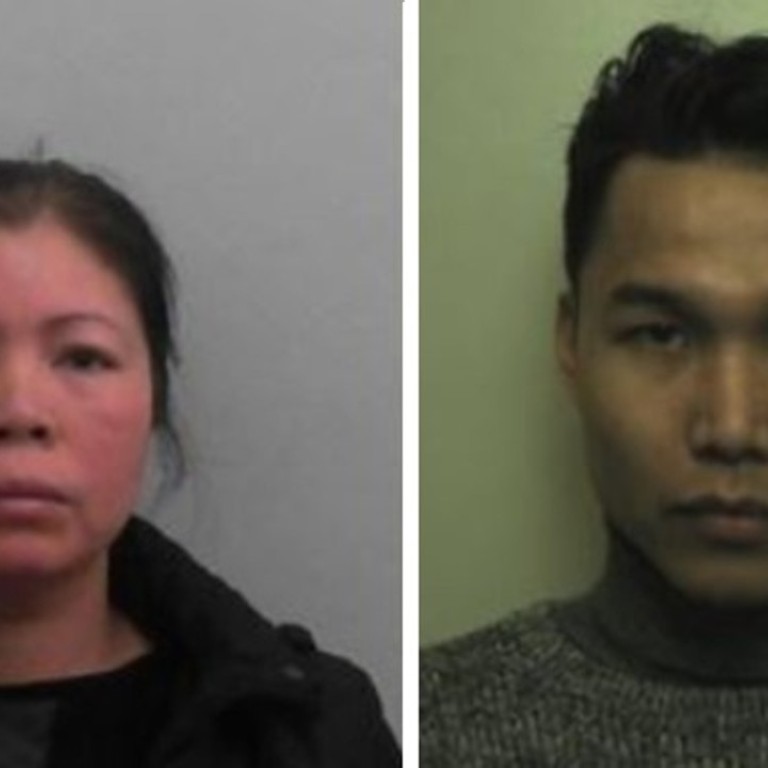
Modern slavers who forced Vietnamese children to work in UK nail salons are jailed
‘They are hiding their victims in plain sight. When people go and get their nails done there can be a victim there’
A woman and man who forced children trafficked from Vietnam to work in nail salons in the UK have been jailed under modern slavery legislation.
Police say it is the first time a successful prosecution involving children has taken place since the laws were brought in two years ago.
The case centres on girls aged under 18 who were smuggled into the UK and compelled to work for little or no money.
Thu Huong Nguyen, known as Jenny, and Viet Hoang Nguyen, known as Ken, were found guilty of conspiring to arrange or facilitate the movement of people for labour exploitation and conspiring to require others to perform forced or compulsory labour at Stafford crown court.
Thu Huong Nguyen, 48, from Bath, was sentenced to five years’ imprisonment, while Viet Hoang Nguyen, 29, from Burton-upon-Trent, was jailed for four years.
[The children] were extremely vulnerable. They were from impoverished backgrounds in Vietnam and had come to the UK seeking a better life
A third defendant, Giang Huong Tran, known as Susan, was found guilty of conspiracy to require others to perform forced or compulsory labour. The 23-year-old from Burton-upon-Trent, was given a two-year suspended sentence.
Officers said they believed many more girls and boys were at risk. They hoped the prosecution would send a message to nail bar owners who use children that they would be pursued, as well as alerting customers to the possibility that young people were being exploited.
The investigation began when police, immigration officials and staff from the charity Unseen visited nail bars in Bath in February 2016. At the Nail Bar Deluxe premises, in the city centre, they found two Vietnamese girls working on clients’ nails.
It emerged they were working 60 hours a week. One was being paid about £30 (US$41) a month while the second was not paid. They were staying at the four-bedroomed home of the owner, Thu Huong Nguyen, in Bath. One lived in a tiny room, while the other slept on a mattress in the attic.
Because Nguyen was out at the time, officers were able to talk to the girls.
Detective Inspector Charlotte Tucker, who led the operation for Avon and Somerset police, said: “They were extremely vulnerable. They were from impoverished backgrounds in Vietnam and had come to the UK seeking a better life.”
The pair were brought into the UK in the back of a truck. It is not known if they were collected by someone from the nail bar or simply dumped in Bath to seek out Vietnamese people such as Thu Huong Nguyen.
The nail bar was lucrative. When police raided Jenny’s home, they found £60,000 in £50 notes hidden inside a teddy bear and a cabinet full of designer handbags, some worth thousands of pounds. She also had a string of bedsits in Bath.
Tucker said: “She was making a lot of money using cheap or totally free labour. Stashing money away in teddy bears suggests she didn’t know what do with all the cash she was making.”
The teenagers were taken into emergency foster care but ran away. “Unfortunately, this is a common occurrence in trafficking cases, as victims are conditioned to feel reliant on those controlling them and compelled to return to them,” said Tucker.
They were re-trafficked but were traced to a nail bar in Abbey Arcade, in Burton-on-Trent, Staffordshire. Two other victims were found there.
Tucker said the girls spoke little English. “They were so vulnerable they had no chance of running away. They were not locked up but had nowhere to go.
“We want to get the point across to the public that they are hiding their victims in plain sight. When people go and get their nails done there can be a victim there who comes here for a better life, sometimes with debt bondage connected to families back home. They are trapped here.
“In the case of nail bars, warning signs could be very young-looking members of staff, low prices, a rapid turnover of staff or controlling behaviour by senior employees. If you have any suspicions, please contact the police.”
The case was run as a “victimless prosecution” – more often used in domestic violence cases where the victim does not necessarily cooperate with the prosecution. “They are so conditioned to believe they are not victims. They didn’t see they had been exploited for gain,” said Tucker.
Donna King, service delivery manager for the charity Unseen, which works with modern slavery survivors, said there were hundreds, possibly thousands, of girls – and boys – being put to work in a similar way. She said many felt they could not defy those exploiting them for reasons ranging from fear of violence to concerns they would be deported because of their immigration status.

